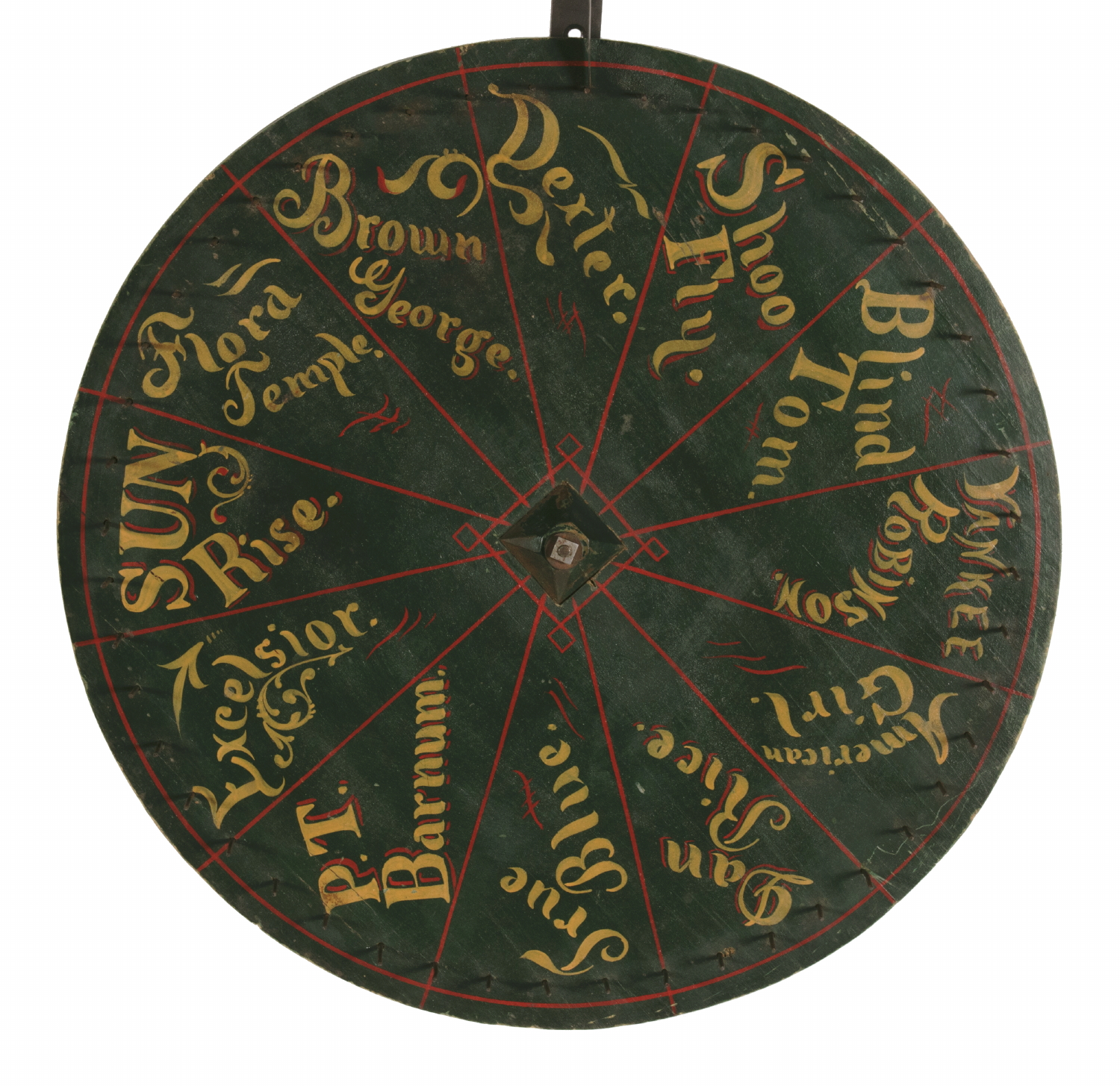
| |
EXCEPTIONAL HORE RACE GAME WHEEL FEATURING THE NAMES OF FAMOUS AMERICAN HARNESS HORSE CHAMPIONS, CA 1870-1880's |
| |
|
| Dimensions (inches): |
20" diameter, 27.75" tall w/ bracket, 3.75" deep w/ bracket & flapper |
| Description: |
|
Paint-decorated American game wheel, made ca 1870-1880's, with a hunter green background, fanciful yellow lettering, scarlet red shading, carriage striping, and embellishment. Painted on a single, 20" wide, circular wooden plank, the game board features the names of 12 harness horse champions from the mid-19th century. The most recognizable among these is Dexter, who was the subject of Currier & Ives lithographs and nearly countless American horse weathervanes. Born in 1858 in Orange County, New York, Dexter dominated harness racing in the mid-to-late 1860's and twice obtained the world record in 1867. In 1866 he won 25 of 26 starts. The Dexter Cup in Freehold, New Jersey, a modern race on the trotter circuit, commemorates his name.
American Girl, also personified in American weathervanes and illustrated by Currier & Ives, was born in Peekskill, New York in 1862, during the Civil War. She dominated in the 1870's, winning 52 races between 1868 and 1875.
Less known by name, but more in song, is Flora Temple, the "Bobtail Mare" from the song Camptown Races. Foaled in 1845 in Oneida, New York, she broke the one-mile record six times, becoming the first trotter to break 2:20. From 1852-1861 she won a whopping 86 of her 103 starts.
The remaining horses include Shoo Fly, Blind Tom, Yankee Robinson, Dan Rice, True Blue, P.T. Barnum, Excelsior, Sun Rise, and Brown George. The names are as colorful as the wheel itself and are rendered in various script, each with a style of its own, interesting characterization, and some with fanciful scrollwork.
The painted surface is excellent, with attractive craquelure and crazing. The original cast iron bracket is present and has a sheet metal flapper. There are 48 steel pins and a large, bench-made, pressed tin washer, raised like a pyramid in the center, and a square nut. A second plank of wood, cut square, squared off at the corners and chamfered, was employed on the reverse and affixed with screws to keep the wide plank from warping.
Where there was gaming, there was often chicanery. A lead weight on the reverse, and a series of metal pins, seem to have been applied at some point to skew the results.
All-in-all, an exceptional example with great age, graphics, colors, paint surface and condition, and a fantastic addition to any gameboard collection.
Condition: There are minor losses, consistent with age and use, but the overall condition is excellent. |
|
|
| |
|
| Primary Color: |
green, yellow, red |
|
| Earliest Date: |
1870 |
|
| Latest Date: |
1889 |
|
| For Sale Status: |
Sold |
|
| Price |
SOLD |
|
| E-mail: |
info@jeffbridgman.com |
|
 |
|
Page Views:... 3805 |
|


